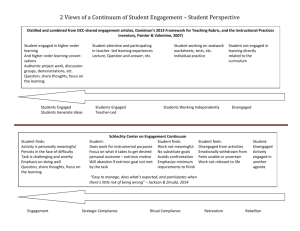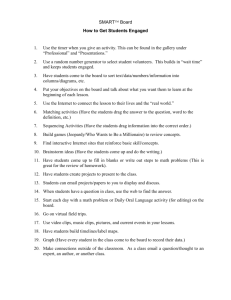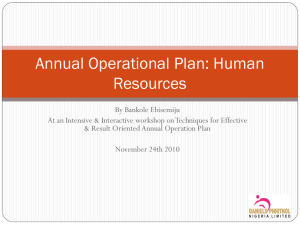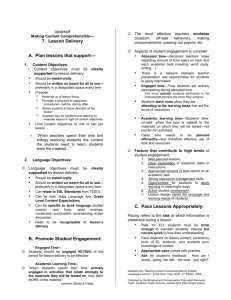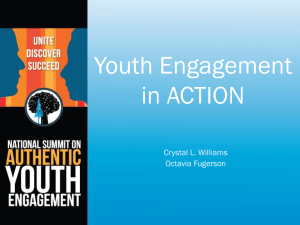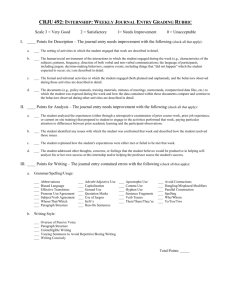A Developmental Community Engaged Learning Requirement
advertisement
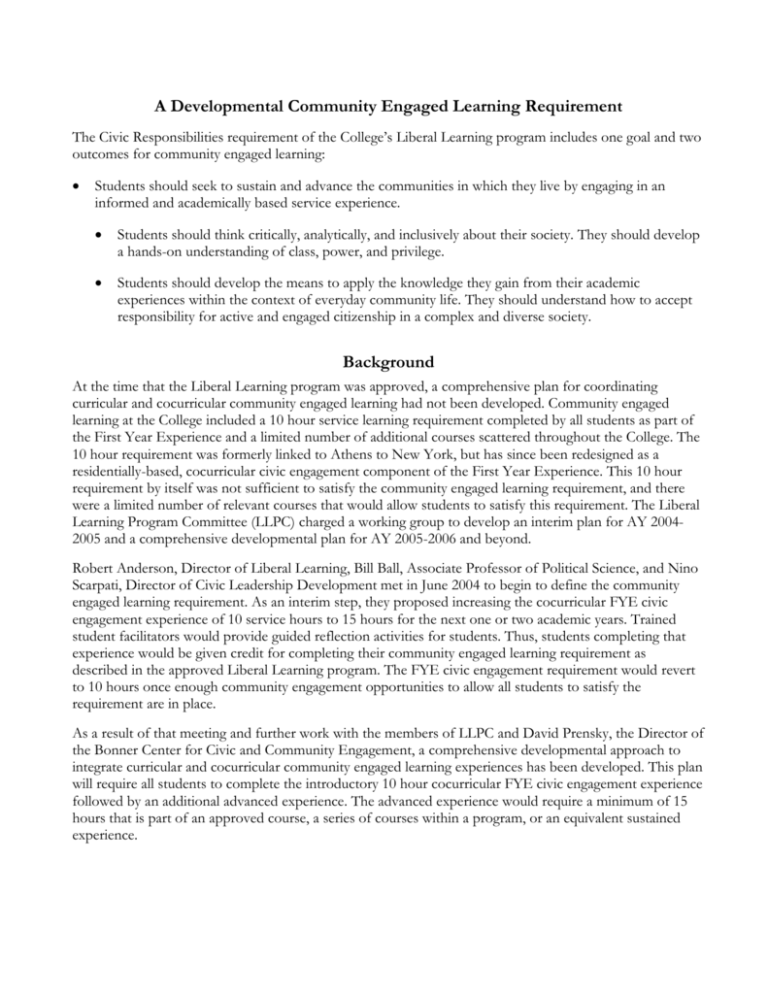
A Developmental Community Engaged Learning Requirement The Civic Responsibilities requirement of the College’s Liberal Learning program includes one goal and two outcomes for community engaged learning: Students should seek to sustain and advance the communities in which they live by engaging in an informed and academically based service experience. Students should think critically, analytically, and inclusively about their society. They should develop a hands-on understanding of class, power, and privilege. Students should develop the means to apply the knowledge they gain from their academic experiences within the context of everyday community life. They should understand how to accept responsibility for active and engaged citizenship in a complex and diverse society. Background At the time that the Liberal Learning program was approved, a comprehensive plan for coordinating curricular and cocurricular community engaged learning had not been developed. Community engaged learning at the College included a 10 hour service learning requirement completed by all students as part of the First Year Experience and a limited number of additional courses scattered throughout the College. The 10 hour requirement was formerly linked to Athens to New York, but has since been redesigned as a residentially-based, cocurricular civic engagement component of the First Year Experience. This 10 hour requirement by itself was not sufficient to satisfy the community engaged learning requirement, and there were a limited number of relevant courses that would allow students to satisfy this requirement. The Liberal Learning Program Committee (LLPC) charged a working group to develop an interim plan for AY 20042005 and a comprehensive developmental plan for AY 2005-2006 and beyond. Robert Anderson, Director of Liberal Learning, Bill Ball, Associate Professor of Political Science, and Nino Scarpati, Director of Civic Leadership Development met in June 2004 to begin to define the community engaged learning requirement. As an interim step, they proposed increasing the cocurricular FYE civic engagement experience of 10 service hours to 15 hours for the next one or two academic years. Trained student facilitators would provide guided reflection activities for students. Thus, students completing that experience would be given credit for completing their community engaged learning requirement as described in the approved Liberal Learning program. The FYE civic engagement requirement would revert to 10 hours once enough community engagement opportunities to allow all students to satisfy the requirement are in place. As a result of that meeting and further work with the members of LLPC and David Prensky, the Director of the Bonner Center for Civic and Community Engagement, a comprehensive developmental approach to integrate curricular and cocurricular community engaged learning experiences has been developed. This plan will require all students to complete the introductory 10 hour cocurricular FYE civic engagement experience followed by an additional advanced experience. The advanced experience would require a minimum of 15 hours that is part of an approved course, a series of courses within a program, or an equivalent sustained experience. A Developmental Community Engaged Learning Requirement Page 2 Community Engaged Learning Program Students must complete a minimum of 25 hours of community work in two components to meet the community engaged learning requirement. Both components will help students to think critically, analytically, and inclusively about community and society. The first component includes service learning work in a community setting and is accompanied by an appropriate reflection activity. The second is an advanced experience that directly links critical thinking about community issues with applied work in a community setting. This reflects a simple developmental model that allows students to progress from awareness to understanding to application through the two components. The First Component The first outcome is the focus of this component: Students should begin to think critically, analytically, and inclusively about their society and develop a hands-on understanding the effects of class, power, and privilege on community development. This component is composed of a 10 hour civic engagement immersion activity and a supervised reflection experience during the First Year Experience (FYE). In the immersion activity, students will spend 10 hours working in direct service with one of more than 30 of TCNJ’s social service partners in the Trenton and Ewing area. These organizations provide services to residents of Mercer County with social, economic, psychological, or educational needs. After their direct service, they will participate in reflections sessions guided by trained residence hall facilitators and produce a written reflection piece that shows basic critical and analytic thinking about their service experience. The criteria for acceptable direct service will be determined by the Office of Civic Leadership Development, and the logistics for the service will be managed by the Office. The list of current service sites and the guide for reflection activities from the Office are attached to this plan. The Second Component The second outcome is the focus of this component: Students should develop the means to apply the knowledge they gain from their academic experiences within the context of everyday community life and understand how to accept responsibility for active and engaged citizenship in a complex and diverse society. This component will also provide students with the opportunity to advance their critical and analytic thinking about their society. Consistent with the CAP report on Liberal Learning, this component will be met by completing a course, a series of courses within a program, or an equivalent sustained experience that meets the second outcome. The course, series of courses, or sustained experience must include directly relevant work in a community organization. Criteria for acceptable courses, course series, or sustained experiences are listed below. A method follows the criteria. A Developmental Community Engaged Learning Requirement Page 3 Criteria 1. Courses and series of courses A. Fifteen hours of work must be completed off-campus at an organization that addresses community issues that are directly relevant to the learning outcomes of the course(s). i. The work must be both informed by the substantive academic concepts of the course and inform the students’ learning of the academic concepts. ii. Organizations can be nonprofit, government agencies, or community-related units of for-profit firms. While advocacy work is acceptable, the written work described below should reflect critical analysis of a community issue that is free from preconceived notion and partiality. iii. The organization must work directly in the community; its work cannot be limited to research about community issues conducted through analysis of secondary data. iv. The 15 hours of work can be direct (service to clients of the organization) or non-direct (work at the organization’s site with the organization’s staff), but cannot be limited to indirect service conducted outside of the community. B. The community work must be an integral part of a significant piece of written or creative work that is completed for the course(s). i. The written or creative work must display the application of academic knowledge to community issues, show an understanding of the role of an active and engaged citizenship in a complex and diverse society, and demonstrate critical and analytic thinking about society. ii. The written or creative work must be part of the course’s capstone assignment; it cannot be a separate assignment written for the purpose of meeting the community engaged learning requirement. iii. Written or creative work completed for the course(s) must advance the mission of the community organization and be made available to the organization. Consistent with academic and other professional standards and ethics, work products that would violate confidences given by student(s) to individual members and staff of the organization with whom they have worked should not be shared with the organization. C. Acceptable courses can include regularly scheduled courses, independent studies, guided studies, independent research, internships, or theses that meet the criteria listed above. 2. Sustained experiences A. The experience must include 15 hours of work that addresses community issues. B. The 15 hours must include a combination of direct service (onsite service provided directly to the organization’s clients or community members) and either non-direct service (onsite work in support of the community organization’s direct service) or indirect service (organizational efforts on campus to support students working with community organizations). C. All students must present written or creative work that explicitly addresses how they used their experience to apply knowledge gained from their academic experiences at TCNJ to the context of everyday community life, furthered their understanding and responsibility for active and engaged citizenship in a complex and diverse society, and demonstrated critical and analytic thinking about society. A Developmental Community Engaged Learning Requirement Page 4 Methods for Approving, Supporting, and Evaluating Courses, Course Series, and Sustained Experiences A standing Community Engaged Learning Advisory Committee to LLPC will be created to evaluate courses, series, and experiences to determine if they meet the community engaged learning requirement. The Bonner Center for Civic and Community Engagement and the Office of Civic Leadership Development will assist schools and departments in supporting faculty and students’ community engaged learning activities. Processes for Approval 1. The Community Engaged Learning Advisory Committee to LLPC will be composed of 1) the Chair of LLPC or designated member of LLPC, 2) the Director of the Office of Civic Leadership Development, and 3) the Director of the Bonner Center for Civic and Community Engagement. 2. Regularly scheduled courses will be submitted to the standing CEL Advisory Committee to LLPC. The submission shall be composed of a course syllabus that contains a description of the roles played by the 15 hours of off-campus work and the significant piece of written or creative work in meeting the community engaged learning outcomes. A. Students taking regularly scheduled courses or course series that have been determined to meet the community engaged learning requirement will be assumed to be involved in community engaged learning activities. Such courses or course series can be reviewed to ensure that they continue to incorporate appropriate community engaged learning work. 3. Students taking independent studies, guided studies, independent research, internships, or theses must present their course approval form for review by LLPC’s CEL Advisory Committee, preferably before the registration period for the course (prior to the semester in which the course will occur—fall for spring courses, spring for fall courses). The course approval forms should be accompanied by a written discussion of how the course will meet the off-campus and written or creative work requirements for community engaged learning. 4. Students using sustained experiences should submit a proposal for their activity to the CEL Advisory Committee before the registration period of the semester one year prior to their expected graduation (for example, spring 2006 for spring 2007 graduates). Final approval is contingent on completion of their written or creative work and documentation of their 15 hours of work. Resources 1. Faculty development programs will be provided by the Bonner Center for Civic and Community Engagement and the Office of Civic Leadership Development. The programs will include A. The Director and Associate Director of the Bonner Center and the Director of the Office of Civic Leadership Development will provide: i. Direct support for the design of community engaged learning activities. ii. Assistance in identifying organizations that are suitable that can offer off-campus work experiences. B. A competitive stipend program will exist during AY 2005-2006 and AY 2006-2007 to support the addition of community engaged learning activities to existing courses. The program will provide modest stipends for course design and completion of community engaged learning assessment tools. 2. Nationwide best practices, published work, and web-based resources on community engaged learning course design, program design, community work, and assessment methods will be catalogued. 3. Approved course syllabi and examples of students’ written work will be deposited in a portfolio of community engaged learning.

